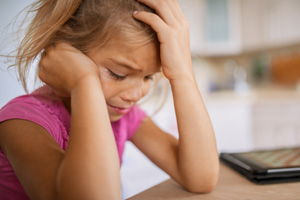
Car accidents are incredibly frightening and dangerous experiences for everyone. However, children are much more vulnerable to severe, life-threatening injuries. The Centers for Disease Control and Prevention (CDC) states that motor vehicle accidents are one of the leading causes of injury and death in children zero to 19. While a child may suffer various types of injuries in a car crash, one less commonly discussed is emotional damage and PTSD.
Post-traumatic stress disorder, or PTSD, is a mental health disorder that occurs after an individual sees or experiences a traumatic event. While many associate the disorder with war veterans, PTSD can occur in any person, including children. Since children have a difficult time understanding their emotions, it’s vital for parents to watch for PTSD symptoms after a car accident.
Identifying Child PTSD Symptoms After an Oregon Car Accident
PTSD in children is highly complex and dangerous. While an adult has a fully developed brain, a child’s brain continues to develop even after they turn 18. Depending on the child’s age, PTSD symptoms may take various forms. Children five years old and below may experience the following PTSD symptoms after an Oregon car accident:
- Bedwetting
- Excessive clinginess
- Separation anxiety
- Thumb sucking
- Fear of darkness
In children between the ages of six, PTSD may manifest as the following symptoms:
- Sleep issues and nightmares
- Inability to pay attention
- Problems in school
- Disruptive behavior
- Sudden changes in behavior
- Isolation and feeling withdrawn
- Headaches and stomach aches
- Changes in diet
While older children between 12 and 17 may have more emotional intelligence, they may still feel discouraged about communicating their feelings and need parental guidance to identify their condition. Consider the following PTSD symptoms they may experience:
- Depression, anxiety, and suicidal thoughts
- Behavioral changes
- Increased irritability and aggression
- Problems in school
- Inability to pay attention
- Diet changes
- Physical complaints like headaches
- Issues with sleep and nightmares
Whether parents are simply worried about their child or suspicious of certain behaviors their child exhibits after an accident, it’s important for parents to trust their gut. In most cases, a “gut feeling” is more about your subconscious picking up on small details and information. If you feel your child may have PTSD after a car crash, schedule an appointment with a medical professional immediately.
How to Support Your Child Through Post-Traumatic Stress
Handling the aftermath of a car accident is overwhelming for anyone, especially children. When your child suffers from PTSD, they may require counseling, support, and sometimes even medical treatment. You and your family deserve justice and compensation for the damages sustained in an accident. When you pursue a car accident injury claim, you can recover compensation for the losses, including the emotional strain on your child.
Treatment costs, psychiatric care, and other necessities may feel out of reach without a lawyer fighting for your rights. If your family was just in a severe Oregon car accident, contact Rizk Law to learn about your legal options. Oregon law allows those in serious car accidents to pursue legal action against the negligent party within two years of the accident. While you have two years to file a claim, it’s best to file as soon as possible.
Contact Attorney Richard Rizk for a Compassionate Oregon Car Accident Lawyer
Pursuing an injury claim is more than just recovering compensation for property damage and physical injuries. A car accident’s emotional toll can have just as debilitating effects on those involved as a physical impairment. Your child and family deserve justice and compensation for the impact PTSD inflicts. Our award-winning Rizk Law lawyers will handle the various aspects of your injury claim. By utilizing our resources and connections within Oregon’s legal community, we will provide you with the best possible outcome for your claim.
Schedule a free consultation with one of our community-centered lawyers by calling (503) 245-5677 or filling out our contact form today.

